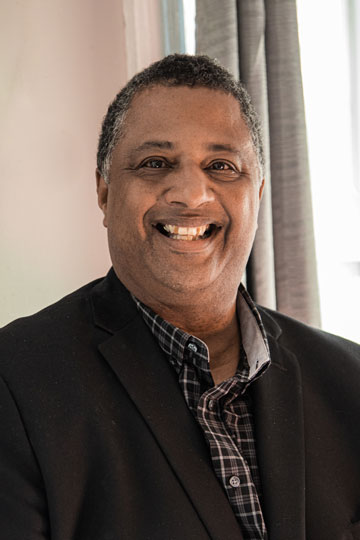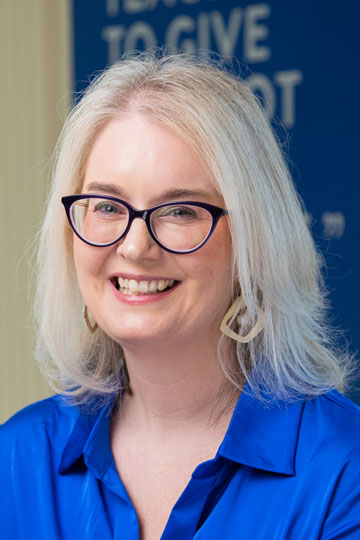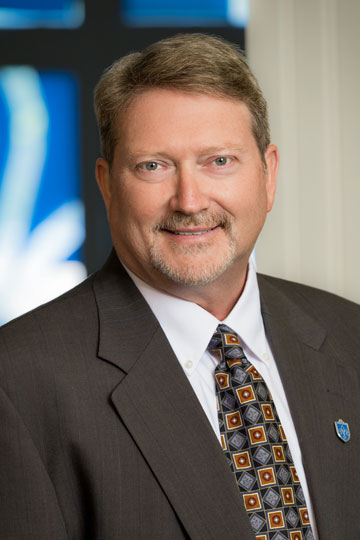Nontraditional for 60 Years
It’s Homecoming and Family Weekend at Saint Louis University. The September air is warm and welcoming, dusk is descending, and the University’s School for Professional Studies is celebrating its 60th anniversary
On the Grand Hall patio, faculty and staff mingle with students. Graduates reunite. Kids weave between tables, checking in with their parents before getting a second snow cone. The crowd is beautifully inconsistent: a variety of ages, a mix of different backgrounds. It’s a snapshot of real life.
And, as anyone familiar with the school will tell you, that’s what the School for Professional Studies, or SPS, is all about.
SPS was founded in 1963 by then University President Paul Reinert, S.J., as Metropolitan College — an arm of the University that offered non-degree programs for working adults and one of the first schools for adult learners in the country. For SLU, it was a natural extension of the University’s offerings and a new opportunity to embrace the Jesuit philosophy of educating the whole person: seeing the needs of a nontraditional learner and understanding that their educational fulfillment matters.
“The model of the Jesuits is to take education to the people,” said Dr. John Buerck, who recently served as interim dean of the School for Professional Studies. “Throughout our history, we’ve done that in different ways, but we’ve always been committed to making a SLU education accessible.”
In 1972, Metropolitan College began offering undergraduate degrees, and in the coming years, the school grew, adding graduate programs and eventually changing its name to the School for Professional Studies in 1996.
Through SPS, students from all walks of life have found a way to weave the pursuit of a degree or certificate into their already busy lives, taking classes at night after a long day caring for children or on Saturdays at the end of a busy work week.
“Our average student is between 30 and 36 years old,” Buerck said. “Most have a job. They’re working full time. They have a family. They have community activities they’re involved in. They can’t just quit what they’re doing to come back to school.”
Buerck (Grad Ed ’93) joined the School for Professional Studies in 1998 as the director of the Department of Computer Information Systems. He’s seen the school’s programs evolve to meet the unique needs of nontraditional students in today’s workforce — men and women of all ages who finally have the support they need to fulfill a dream they’ve held onto for years.

Then, in 1997, he got the sign he needed.
“I’ll never forget, I was driving to work, and I heard a radio commercial for the School for Professional Studies,” Willis said.
He called the number, made a plan with the help of his SLU advisor, and went back to school, taking classes on campus two nights a week. He was buoyed by the support of his wife, Ericca, and their children, and when he set foot in the classroom, he was heartened by the diversity of the participants.
“Everybody comes from different backgrounds and different experiences. From my very first class, I knew I belonged there. I knew it was for me,” he said.
Letting students know they belong and meeting them where they are is nothing new for the School for Professional Studies, but in 2008 school leadership took another major step forward in their mission by offering SLU’s first online degree program.
“When you think about the evolution of education, we’re not building many new universities anymore,” Buerck said. “Instead, it’s about finding new ways to bring education to the people, and technology can help us do that.”
By 2009, SPS was offering all of its degrees fully online, putting SLU ahead of the curve when the pandemic hit in 2020.
“When COVID-19 hit, universities around the world had to move online quickly,” Buerck said. “By that time, we’d been online for years, so we were able to keep moving forward easily.”
By offering all its degree programs online, SPS has also opened doors for a new generation of students for whom busy schedules and distance make in-person learning a challenge.

“Getting my bachelor’s degree was something I dreamt about for a long time but never thought was possible,” said Tina Curtis (PS ’22). “I tried to get back to school numerous times, but with young children, going back into a classroom wasn’t going to work for me.”
Then, in 2020, an online search led her to the SPS website.
“I started doing the research, saw that they had 100% online learning, and I was like, ‘Yeah, this is for me,’” she said. “I took a leap of faith. I applied that very same night and heard back from somebody early the next week.”
Curtis took on a full-time course load as she worked toward her bachelor’s degree in general studies. Some nights, she’d sit down at the computer right after work. Other nights, she’d wait until after dinner, when everyone was settled for the evening.
“It was a challenge, but with the help of my advisors, I had a path forward, and it was an enjoyable path because I was doing something to better myself,” she said.
For both Curtis and Willis, a bachelor’s degree obtained through SPS opened professional doors. Curtis’ degree enhanced her skills and marketability as an accounts payable supervisor. In August 2023, she made the decision to return to SPS to earn a master’s degree in leadership and organizational development.
Willis’ degree in nonprofit management gave him the credentials and confidence to apply for new jobs. But for both graduates, some of the greatest satisfaction was exemplified in the smiling faces of their families on graduation day.
“I can remember looking up in the seats at my children and my wife and saying, ‘I did it.’ I did that for them,” Willis said.

For Buerck, seeing the pride that the students feel, in their accomplishments and in their alma mater, never gets old.
“They’re proud to be obtaining a Saint Louis University education. They’re humbled. They’re excited. So are their families,” he said.
As interim dean, Buerck has had a front-row seat to the school’s 60th anniversary and the future of SPS, watching with his own sense of pride as the school continues to grow and expand its reach.
One major source of growth is SLU’s Global Graduate initiative, launched in 2020 to recruit international students for key business, technology and engineering programs. There a recurrently more than 1,700 Global Graduate students enrolled in SPS.
Many of the newer SPS programs, including the Brewing Science and Operations Certificate and the new Cannabis Science and Operations Certificate, have been added to meet the unique needs of today’s workforce.
“We’re a very workforce-driven school,” Buerck said. “Oftentimes, these industries come to SLU. They can’t find the professionals they need, and they ask us if we’ll consider starting a new program.”
These direct connections with local and national corporations and the growing global
student population have led to steady growth for SPS, which has, in turn, led to the
need for more faculty. That’s next on Buerck’s list, and he’s happy to tackle such
a good
problem.
“Sometimes people ask me what I do, what’s my job. I tell them that I have the best job in the world,” he said. “I get to work with faculty and staff who create curriculums that change people’s lives.”
Taking Education and Training to the People
SPS offers a variety of programs designed to give students and graduates access to the resources they need, including:
In partnership with SPS, Jesuit Worldwide Learning offers a free online Bachelor of Arts degree in general studies to students in and around refugee camps in Kenya and Malawi. SLU provides courses, faculty and remote student support. The program will formally launch in March.
The Transformative Workforce Academy (TWA) prepares and connects justiceinvolved job seekers with vetted secondchance companies willing to look beyond a candidate’s record. TWA provides résumé assistance and support, as well as training for employers.
In addition to offering summer and winterterm courses, the Summer and Extended Studies Office delivers summer K-12 camps and academies and provides high school students, as well as visiting, non-degree seeking and international students, the opportunity to take SLU courses year-round.
The Saint Louis University Workforce Center is one of the largest continuing education and professional development centers in the region, providing live training solutions to individuals, corporate teams and organizations worldwide.


















